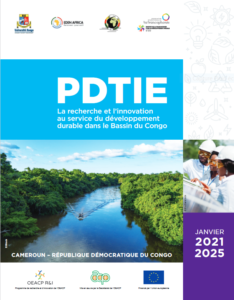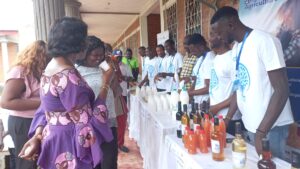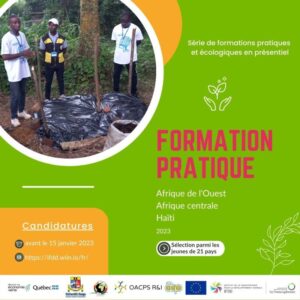Director of the Francophonie Institute for Sustainable Development, Cécile Martin-Phipps represents the International Organization of La Francophonie at the 6th edition of the ‘One Forest Summit’, which takes place in Libreville, Gabon, from March 1 to 2, 2023. This international summit, initiated by Gabon and France, aims to advance the collective ambition of countries regarding the preservation and sustainable management of forests, which are essential to meet the challenges of climate change and biodiversity loss. She talks to us about the stakes of this summit, the Congo Basin and the PDTIE project that IFDD is coordinating in two countries in the region, Cameroon and the Democratic Republic of Congo.
Could you summarise the stakes of this summit in a few words?
This summit addresses a triple challenge. It is of course firstly part of the achievement of the Sustainable Development Goals by 2030, also in the implementation of the Paris Agreement (especially in terms of innovative financing) and, lastly, it is the Kunming-Montreal Global Biodiversity Framework, an ambitious framework adopted last December that the States must now develop into action plans.
This summit aims to protect and sustainably manage tropical forests, which represent a very special ecosystem. Can you remind us of the importance of these forests, and more particularly those of the Congo Basin, a region in which the IFDD operates?
The Congo Basin is quite unique. It is the first or second largest forest basin in the world. It is our lung and it is also an extremely rich ecosystem. We are talking about forests, but we should also talk about peat bogs, mangroves, and all the fauna and flora, which are extremely rich. This ecosystem has been little studied. The difference here with the other tropical forests of Asia and Latin America, which are all at different degrees of deterioration, is that, notably in Gabon, but also in Congo Brazzaville and the DRC, you have large parts of the territory that are still virgin. So the question is how to put a price on this non-deforestation, knowing that in our capitalist market system, we cannot put a price on what we do not destroy.

The IFDD is coordinating the PDTIE project-jointly supported by the Organization of African, Caribbean and Pacific States and the European Union- aimed at deploying environmental technologies and innovations for sustainable development and poverty reduction in the Congo Basin, more precisely in Cameroon and the Democratic Republic of Congo. How can environmental research and innovation make a difference in the preservation and sustainable management of forests?
This region is facing both environmental and agricultural problems. We have a non-existent local food industry, artisanal when it exists, which has difficulty in satisfying the needs of the national or sub-regional market, with significant post-harvest losses, seasonal availability of raw materials that is quite low, and a disconnection of the population from local crops to the benefit of imported products. This problem has been aggravated by COVID-19, which has led to a loss of about 75% of fruit and vegetable production. This has led to an increase in food insecurity and child malnutrition. However, we are in a region where the soil is very rich. The objective of the PDTIE is to systematize innovation among hundreds of young people. The 20 best agri-food innovations are currently maturing, with about 15 being patented. When we talk about innovation, we are often talking about a return to good ancestral practices, where we seek to protect biodiversity, but also to meet a food need, while preserving the climate, while managing water and other resources economically. And of course today, we have new technologies that can help us, whether in terms of energy or digitalization. Among the agri-food innovations, there is for example the manufacture of ecological packaging to replace plastic from agricultural waste. We also have the manufacture of machines to reduce the drudgery of agricultural work. For example, I will mention machines to harvest cassava, which is widely consumed here, solar cold rooms, automatic packaging units, and autonomous and intelligent storage equipment. There are also innovations to facilitate the culinary tasks of women, for example, ready-to-use African flours, and modern preserves of African dishes. It’s things like that, where we reappropriate a little bit the local know-how. And then it has to do as well with populations with food supplements, and slimming drinks because you have a demand. But rather than consuming made in America, we can do local with endogenous products. There is also the substitution of inputs, which are There is also the substitution of inputs, which are largely imported in the manufacture of products like beer. Or the use of digital technologies to improve agricultural productivity and product quality, for example, agricultural monitoring with a cell phone. It’s very simple, but we had to think about it. The same goes for cocoa certification. There are hundreds of innovations here. The French-speaking population is very large and 70% is under 35 years old.

How do you support these young innovators?
In two ways. First, we accompany them through the entire process of building their project, right up to the market launch and even the patent. At the same time, we strengthen the skills of these young entrepreneurs or innovators. Because the idea is really to ensure that all the parameters and all the challenges are taken into account. I was talking about climate, water, energy, and biodiversity. Generally, we have a focus, it is compartmentalised and in silos, because the funding also comes in silos. And so, the idea for us is really to offer them a range of training courses, about sixty environmental jobs that also allow them to have real visibility of what they could do. For example, I am a farmer, I am looking to develop this or that plant for food consumption in my country. But here, if I think about endogenous and organic inputs, it would be fabulous. I also need water for this crop. How do I want to get it? Could it be solar pumping? How would I like to automate my production, giving the plant exactly what it needs through digital tools? So there’s a lot of things actually, that you can approach holistically.

What are your feelings and/or your expectations, a few hours before the closing of this One Forest summit in which you participate?
These summits are criticised by many. But they are also extremely important steps. The Francophonie for sustainable development encompasses 88 Member States and governments. It is an opportunity to see our partners, whether at the ministerial level, or local actors, with young entrepreneurs who come from the entire sub-region, it is extremely rich. Therefore, in this sense, I find this summit a success because it already allows us to have a mix, to multiply moments of exchange to make these negotiations concrete. The communication is also there to highlight what each of us can do. There is a business forum that will start shortly and that will allow putting forward innovative companies, small companies as well as big ones. And I find that very interesting.
